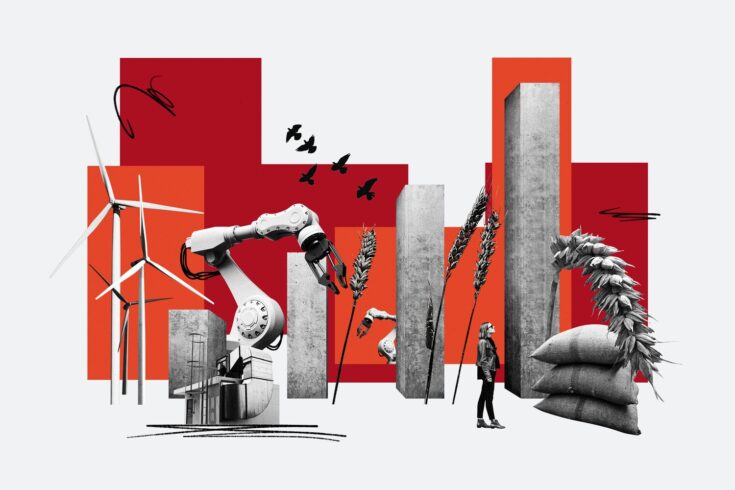There’s a lot of talk about economic growth and productivity in the UK right now, more particularly the lack of it and how we might improve it.
Most politicians and businesspeople would agree that more investment in research and development and innovation is key to improving both.
I see research and development – and the innovations they bring – as about much more than making new things, or existing things more cheaply.
They also improve our quality of life and help us use resources effectively. We all need to understand how this research and development feeds more broadly and deeply into economic growth.
The UK government has a longstanding commitment to improving the level of research and development in the UK. So, it’s worth considering why this is so important and why I think the work we do at UK Research and Innovation (UKRI) is a vital part of this.
Supporting growth and a strong society
I’ve worked in the public sector for almost 20 years, helping government distribute and assess the impact of billions of pounds in funding and formulate policy on topics that support economic growth as well as a strong society and environment.
For example, I’ve worked on improving thermal efficiency standards of housing, turning around the lives of troubled families and supporting an emergent renewable energy industry around the Humber.
Whether or not worthwhile things can be quantified in a business case has generally not got in the way of sensible decisions to invest, though it has certainly made it a harder slog on occasion.
Generating new knowledge
Research and development generates new knowledge, ranging from abstract truths such as the laws of thermodynamics to practical techniques to increase aeroplanes’ fuel efficiency by reducing drag and otherwise pushing the boundaries of what humans can do.
Directly or indirectly, this knowledge makes it possible for workers to make their resources go further and get more from their physical capital, making them more productive.
This knowledge can be made into something with a commercial value. Indeed, you can see innovation as the process of getting added-value business from research and development knowledge.
The knowledge can also be of great societal value where it supports our understanding of and ability to influence the world around us.
At UKRI we are at the forefront of funding research that expands the boundaries of human knowledge, both at the early or blue skies end where we do not know what applications it may ultimately have and in closer-to-market interventions to get innovation out there.
We are investing in people
When we are supporting research and development, we are investing in people, in their skills and human capital.
Investing in education and training tends to increase workers’ productivity and wages, not to mention wider impacts such as increasing their mobility, participation in society and the labour market and improving health outcomes.
A research and innovation system that brings in a diverse range of talent is more likely to come up with new ideas and different approaches, which are the essence of innovation.
A system that promotes interaction, collaboration and cross-fertilisation of ideas can make even more returns from this investment in human capital.
Investing in research facilities
When we are investing in the kit, facilities, institutions and other infrastructure of research and development, we are also driving economic growth.
The development of this infrastructure delivers a strong research base and drives high-quality research and the development of transformational technologies.
We make these facilities available to researchers from the public, private and charitable sectors, leading to substantial co-investment and direct economic impacts.
I constantly see the power of a system that brings together people, facilities and ideas, driving better returns from the investment in physical capital.
Supporting wide variety of research
We have to keep supporting different types of research, from ‘blue skies’ thinking to research with real-world applications. They perform distinct but related roles in driving growth.
Basic research, which is focused on understanding fundamental scientific principles, tends to have a more long-term impact.
Its uses may take longer to feed through, and not always in ways we might anticipate. It can lead to the development of significantly new or different technologies or industries.
Applied research can feed through to productivity and growth more quickly by improving existing products and process.
We need both types of research.
Taking the business opportunities
We can also support research and development and innovation, and ultimately drive economic growth, by supporting researchers, innovators and entrepreneurs to make the most of business opportunities.
Knowledge exchange and financial support helps firms gain value from their innovations.
A stable institutional and regulatory environment, around things as fundamental as the rule of law and enforceable intellectual property rights, also gives confidence to investors.
There is much at stake
For me, what’s at stake is substantial. Research and development leads to breakthroughs and the birth of new industries, providing new opportunities for example as old technologies and industries make way for new, driving improvements in the competitiveness of a country in key or emerging sectors.
Countries that invest heavily in research and development tend to have more advanced technologies and industries.
This leads to a virtuous circle of attracting inward investment and highly skilled workers, further driving growth.
When we combine all these ways of supporting and investing in research and development and innovation, we deliver a result that is more than the sum of its parts.
It boosts productivity, creates new businesses and expands existing ones, creates high-quality jobs, overcomes societal challenges and improves living standards.
The real path to economic growth
In my work at UKRI, we oversee the funding of all these drivers of economic growth, from the knowledge, skills and infrastructure to supporting businesses in taking their ideas to real-world applications.
I’ve been honoured and humbled to visit some of our investments, from satellite test facilities to multidisciplinary institutes bringing together researchers in new ways and opening up new collaborations, and high-tech behind-the-scenes museum imaging.
These are just the tangible facilities and pieces of kit UKRI funds. The wealth of knowledge and skills in the students and academics we support and the crucial wider world of people who make up the research and innovation community all can and do contribute to the way this country uses (and makes ever better use of) our resources. I believe that is the real path to economic growth.




